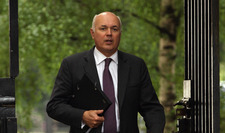 As far back as last September, Iain Martin wrote that Iain Duncan Smith’s plans to reform the welfare system were going to run into trouble over cost:
As far back as last September, Iain Martin wrote that Iain Duncan Smith’s plans to reform the welfare system were going to run into trouble over cost:
‘But there is no way these proposals, as drafted, will be implemented by a Conservative government, for one simple reason: they carry an estimated up-front increased cost of £3.6bn. A Treasury and Tory Chancellor desperate to find massive savings quickly will never nod that through even if advocates of these proposals promise vast “long-term” savings. Officials will simply say: how many times have we heard such talk before?’
It would be a real tragedy if the political will built up to take serious action on this issue was wasted out of a failure to make the sums add up. For that reason, at the TPA we’re launching a major report today that sets out how to achieve radical benefit reform and save money immediately, before the massive additional savings from getting people back into work.
The critical step is to change the poverty target. Trying to get everyone above 60 percent of median income has broken the system and resulted in it becoming mind numbingly complex. There are 8,690 pages of guidance for DWP benefits alone. Too many people fall through the net, the number of people living in households in severe poverty – less than 40 percent of median income – has risen from 5 to 6 percent over the last decade. £4.5 billion a year is lost to error and fraud, according to a recent Government report. With the withdrawal of benefits and higher taxes, the £5.80 minimum wage can be worth as little as 26p.
If we change the target to 50 percent (ideally pending a switch to an absolute standard of poverty) then we can put in place a single negative income tax, cap marginal withdrawal rates at a much more sensible 55 percent and save £1.7 billion immediately. There would then be much greater savings down the line as the reformed system got people back into work. That would massively improve incentives to work and be an incredible simplification. Some people would lose out to a certain extent, but it would also stop the poorest falling through the net.
Radical welfare reform is possible in a fiscal crisis. And it is vital if we want to break open the welfare trap so ordinary Britons can take advantage of opportunities in the recovery from the recession.
Matthew Sinclair is Research Director at the Taxpayers’ Alliance.






Comments